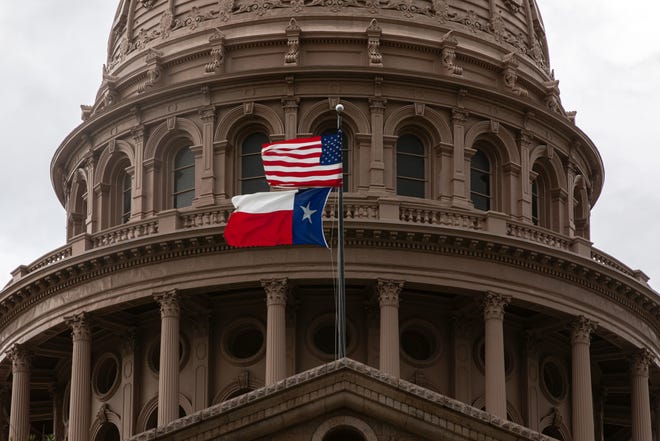Texas is about to pass a new law Republicans say will stop censorship of conservatives on Facebook, Twitter
Texas is on the verge of passing a new law that would crack down on social media companies Republicans say are censoring conservative speech.
The legislature passed the bill. It now heads to the desk of Gov. Greg Abbott, a Republican who has publicly backed it and is expected to sign it.
The new law, passed in the final days of the second special session called by Abbott, would allow any Texas resident banned from Facebook, Twitter or Google's YouTube for their political views to sue the companies. The state attorney general also would be able to sue on behalf of a user or a group of users.
It is similar to a Florida law that was blocked by a federal judge one day before it was set to take effect.
Trade groups representing the technology industry have pledged to challenge it as unconstitutional.
“By ignoring the First Amendment, the Texas Legislature has chosen to abandon its own conservative and constitutional values in order to put the government in control of speech online," said Carl Szabo, vice president and general counsel of NetChoice.
Dozens of states are considering legislation that targets how social media platforms regulate speech, though few have gotten this far.
Such bills resonate with conservatives who believe their First Amendment rights are violated when posts are labeled or removed or when they are banned for violating the policies of social media platforms. Former President Donald Trump's suspensions from the major platforms spurred the new bills.
The First Amendment protects people from censorship by the federal government, not from content moderation decisions by private companies.
Social media companies say they don't target conservatives, only harmful speech that violates their rules.

Texas House Democrats warned during a hearing last week that the new law would stop social media companies from taking down harmful content.
They offered amendments that would have allowed the removal of posts promoting Holocaust denial, terrorism and vaccine disinformation, but were defeated.
"When you force social media platforms to pull their referees, the bad guys are going to throw more fouls on the court,” said Adam Kovacevich, CEO of Chamber of Progress, a tech industry coalition that includes Facebook and Google. “Unfortunately this law is only going to put more hate speech, scams and misinformation online, when most people want a safer, healthier Internet."
Florida law came after Trump bans from Facebook, Twitter
Florida was the first state to push through legislation when Gov. Ron DeSantis, a Trump ally, signed a bill in May that penalizes social media companies for removing or barring the speech of politicians.
However,a federal judge temporarily blocked the new law after NetChoice and the Computer & Communications Industry Association – lobbying groups that represent Facebook, Google and other tech giants – sued. DeSantis is appealing.
Both Abbott and DeSantis are widely seen as possible GOP 2024 presidential contenderscoming from big states with large electoral votes. Abbott is facing his first challenging Republican primary to be re-elected governor.
“Big Tech’s efforts to silence conservative viewpoints is un-American, un-Texan and unacceptable and pretty soon it’s going to be against the law in the state of Texas,” Abbott said at a news conference announcing similar legislation in March.
Conservative think tank The Heartland Institute recently estimated that 70 bills in 30 states are challenging “big tech censorship.”
GOP claims tech companies 'cancel' conservatives
The Republican claim that powerful tech companies are biased against and "cancel" conservatives is emerging as a top issue to rally the base in the 2022 midterm elections.
The GOP is betting it will boost voter registration, turnout and fundraising as it tries to retake the U.S. House and Senate, political observers say.It also could help Republicans at the state level.
"It's an issue that Republican state legislators know will energize and agitate their base," Ari Cohn, free speech counsel for tech think tank TechFreedom, told USA TODAY.
Trump, who was suspended from the major social media platforms after the Jan. 6 insurrection, escalated his war with Big Tech in July when he filed suit against Facebook, Google and Twitter and their CEOs, claiming the companies violated his First Amendment rights.
Trump and Republicans fundraised off the lawsuit, though legal experts say it has virtually no chance of success.
The perception that tech companies and the billionaire CEOs who run them are biased against conservatives has been around for a long time, but intensified as Trump made “social media abuses” a major plank of his administration and reelection campaign.

After he lost the presidency, Trump vilified tech companies for labeling or removing posts that spread falsehoods about the outcome of the presidential election.
Complaints of ideological bias come from across the political spectrum, but it’s difficult to prove social media platforms are targeting any one group. Tech companies disclose little about how they decide what content is allowed and what is not.
Researchers say they’ve found no evidence to support GOP grievances that social media companies stifle conservative voices.
If anything, they say, social media platforms amplify the voices of conservatives, shaping the worldviews of millions of voters.
But for some conservatives, the 2020 election proved Big Tech's ideological bias. They point to tech companies throttling the spread of a New York Post article which made uncorroborated claims about Hunter Biden’s business dealings, the Trump social media bans and the takedown of Parler, a social media platform popular with the political right.
Nine in 10 Republicans and independents who lean toward the Republican Party say it’s at least somewhat likely that social media platforms censor political viewpoints they find objectionable, up slightly from 85% in 2018, according to an August report from the Pew Research Center.





Nessun commento:
Posta un commento